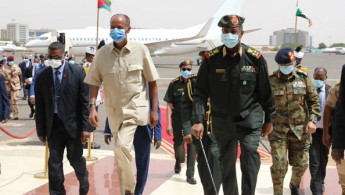Sudan's warring army chief in Eritrea for latest foreign trip
Sudan's General Abdel Fattah al-Burhan, at war for the past five months with paramilitaries, is visiting neighbouring Eritrea on Monday, officials in both countries announced.
It is the fourth foreign trip in two weeks by Burhan, the northeast African country's de facto leader since a coup in 2021. Since August 29 he has visited Egypt, South Sudan and, last week, Qatar. Experts say it is part of an effort to burnish his diplomatic credentials in the event of peace negotiations to end his country's devastating war.
Eritrea's Minister of Information Yemane Meskel announced on X, formerly Twitter, that Burhan arrived in Asmara on Monday "for working visit," and published a picture of him seated beside Afwerki.
They would discuss "the future of bilateral relations and strengthening them", a press release from Burhan's office said earlier.
Eritrea, which borders Sudan to the southeast, is one of the rare neighbouring countries that has not welcomed any of the more than one million refugees fleeing the war, as the border has been closed since 2019.
Eritrea is one of the world's most isolated states.
At the beginning of September Burhan announced from Kassala, a Sudanese state bordering Eritrea, that Sudan's border posts were reopening. It is also a sign that security will intensify along a border long known for its porousness.
Afwerki participated in a meeting in Cairo mid-July with heads of state of Sudan's neighbours, condemning "a war launched for no reason" in Sudan.
More than 24 million people, or around half of Sudan's population, are in need of humanitarian aid and protection, more than half of whom are children. @mespanolescofet takes a deeper look at the human cost of Sudan's war ⬇ https://t.co/33H7djw8yC
— The New Arab (@The_NewArab) September 1, 2023
Battles that began April 15 between the army and the paramilitary Rapid Support Forces (RSF) of General Mohamed Hamdan Daglo have killed nearly 7,500 people, according to a conservative estimate from the Armed Conflict Location & Event Data Project.
In one of the war's deadliest single attacks, air strikes killed at least 46 people and injured dozens Sunday at a market in the south of Sudan's capital Khartoum, local activists said.
On Monday, the Mayo neighbourhood resistance committee announced it was going to bury "12 unidentified bodies" after the "massacre of the Qouro market". The committee is one of many groups that used to organise pro-democracy protests and now provide assistance during the war.
The armed forces control the skies over Khartoum, while RSF fighters continue to dominate the city's streets.
On Sunday RSF accused the military of the "air strikes against civilians in the south of Khartoum." The armed forces denied attacking the market, saying it "fully adheres to international humanitarian law."
The war has uprooted more than five million people, including one million who fled across borders, according to United Nations figures.





 Follow the Middle East's top stories in English at The New Arab on Google News
Follow the Middle East's top stories in English at The New Arab on Google News


